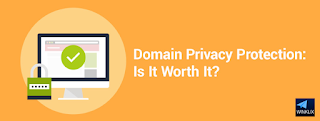What really is domain privacy and why should anyone purchase it?
I’m not much of a lazy person, so I often frequent hotels on different destinations with friends and family. As someone who used to work in the hotels industry, I’m all for a personalized touch when it comes to service. But when the hotel staff bids me good evening with the use of my full name, it’s always a little jarring. How did he get that information? Did I tell him my last name?
Nope. But it was certainly present on my driver’s license he checked when I checked in in the hotel. It was also on my credit card. The point is, I willingly offered up this private information in order to enjoy my night out. I just didn’t expect him to retain it.
The same scenario applies when it comes to purchasing domain names — which is why domain privacy is such a big deal.
What’s domain privacy?
Domain privacy is the ability to mask the information you used to register your domain name. When you purchase a domain from a company like Winklix (or any other registrar for that matter), they are required to report specific bits of information about the consumer for public record. That public database is called the WHOIS directory.
You don’t have to use domain privacy. In fact, a number of larger businesses with corporate addresses and already-public information often don’t feel the need. But if you’re a small business owner, a blogger or owner of a personal website, you might feel differently.
Here are just a few bits of information that get reported to WHOIS when your register a domain:
- First name
- Last name
- Address
- Phone number
And more. So if you’re not willing to share this personal information, look into domain privacy.
How do I get it?
The process varies from registrar to registrar, but for the most part, it’s pretty simple. You have one of two options:
1. Purchase domain privacy at the time of registration.
Once you’ve found your awesome domain name, you should have the ability to add domain privacy before checking out. If you don’t see it in as an option in your cart, call customer service. A representative should be able to help you add domain privacy.
2. Purchase domain privacy at a later date.
You can add domain privacy to any domain you’ve registered at any point in time. However, if you have the ability to add privacy up front, do so.
If you don’t add privacy immediately, your information will be posted publicly.
That’s not to say that your information won’t become private after adding domain privacy, but there will still be time for spammers and scammers to take advantage of your personal details. Plus, the internet archives data, which can be searched by using the Wayback Machine.
Play it safe
When it comes to your personal details, don’t skirt the edges — safeguard your information by adding domain privacy. And if you’re thinking about using false information, don’t.
If you’re caught using false info, you might lose your domain.
Anyone can report suspicious registration information by filling out a complaint form through ICANN (Internet Association for Assigned Names and Numbers). You’ll be given a deadline to update your info, but it isn’t worth the risk. If you don’t want your information public, just purchase domain privacy.


Comments
Post a Comment